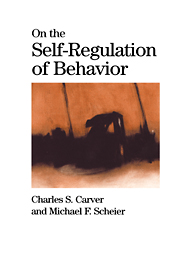Book contents
- Frontmatter
- Contents
- Preface
- Acknowledgments
- 1 Introduction and Plan
- 2 Principles of Feedback Control
- 3 Discrepancy-Reducing Feedback Processes in Behavior
- 4 Discrepancy-Enlarging Loops, and Three Further Issues
- 5 Goals and Behavior
- 6 Goals, Hierarchicality, and Behavior: Further Issues
- 7 Public and Private Aspects of the Self
- 8 Control Processes and Affect
- 9 Affect: Issues and Comparisons
- 10 Expectancies and Disengagement
- 11 Disengagement: Issues and Comparisons
- 12 Applications to Problems in Living
- 13 Hierarchicality and Problems in Living
- 14 Chaos and Dynamic Systems
- 15 Catastrophe Theory
- 16 Further Applications to Problems in Living
- 17 Is Behavior Controlled or Does It Emerge?
- 18 Goal Engagement, Life, and Death
- References
- Name Index
- Subject Index
17 - Is Behavior Controlled or Does It Emerge?
Published online by Cambridge University Press: 05 June 2012
- Frontmatter
- Contents
- Preface
- Acknowledgments
- 1 Introduction and Plan
- 2 Principles of Feedback Control
- 3 Discrepancy-Reducing Feedback Processes in Behavior
- 4 Discrepancy-Enlarging Loops, and Three Further Issues
- 5 Goals and Behavior
- 6 Goals, Hierarchicality, and Behavior: Further Issues
- 7 Public and Private Aspects of the Self
- 8 Control Processes and Affect
- 9 Affect: Issues and Comparisons
- 10 Expectancies and Disengagement
- 11 Disengagement: Issues and Comparisons
- 12 Applications to Problems in Living
- 13 Hierarchicality and Problems in Living
- 14 Chaos and Dynamic Systems
- 15 Catastrophe Theory
- 16 Further Applications to Problems in Living
- 17 Is Behavior Controlled or Does It Emerge?
- 18 Goal Engagement, Life, and Death
- References
- Name Index
- Subject Index
Summary
Thus far in the book we've tried to build a conceptual edifice that portrays a self-regulating person, including problems. In this chapter we do something different. We raise the question of whether we've been leading you down a primrose path.
In our earlier discussions we evaded some questions. In this chapter we confront one of them, from several different angles (evading others successfully for the rest of the book). In particular, we've assumed that self-regulation at the level of our interest tends to involve something resembling an executive process. People form intentions to do things, then they go and do them. But is this assumption necessary? Is it a mistake?
Conceptual bases for raising this question occur in several literatures. The literatures are intriguing, and the points they make are very different from those made elsewhere in this book. We address three of them here: the literature of coordinations (which leads us back into the domain of dynamic systems), the literature of connectionism, and the literature of robotics (see Montefiore & Noble, 1989, for other views on these questions).
COORDINATION AND COMPLEXITY EMERGENT FROM SIMPLE SOURCES
The literature of coordinations focuses largely on coordination of physical movement. This literature is substantial, dealing with many interesting questions (e.g., Kugler & Turvey, 1987; Turvey, 1990), but our present interest is confined to a few of its themes.
- Type
- Chapter
- Information
- On the Self-Regulation of Behavior , pp. 317 - 345Publisher: Cambridge University PressPrint publication year: 1998



